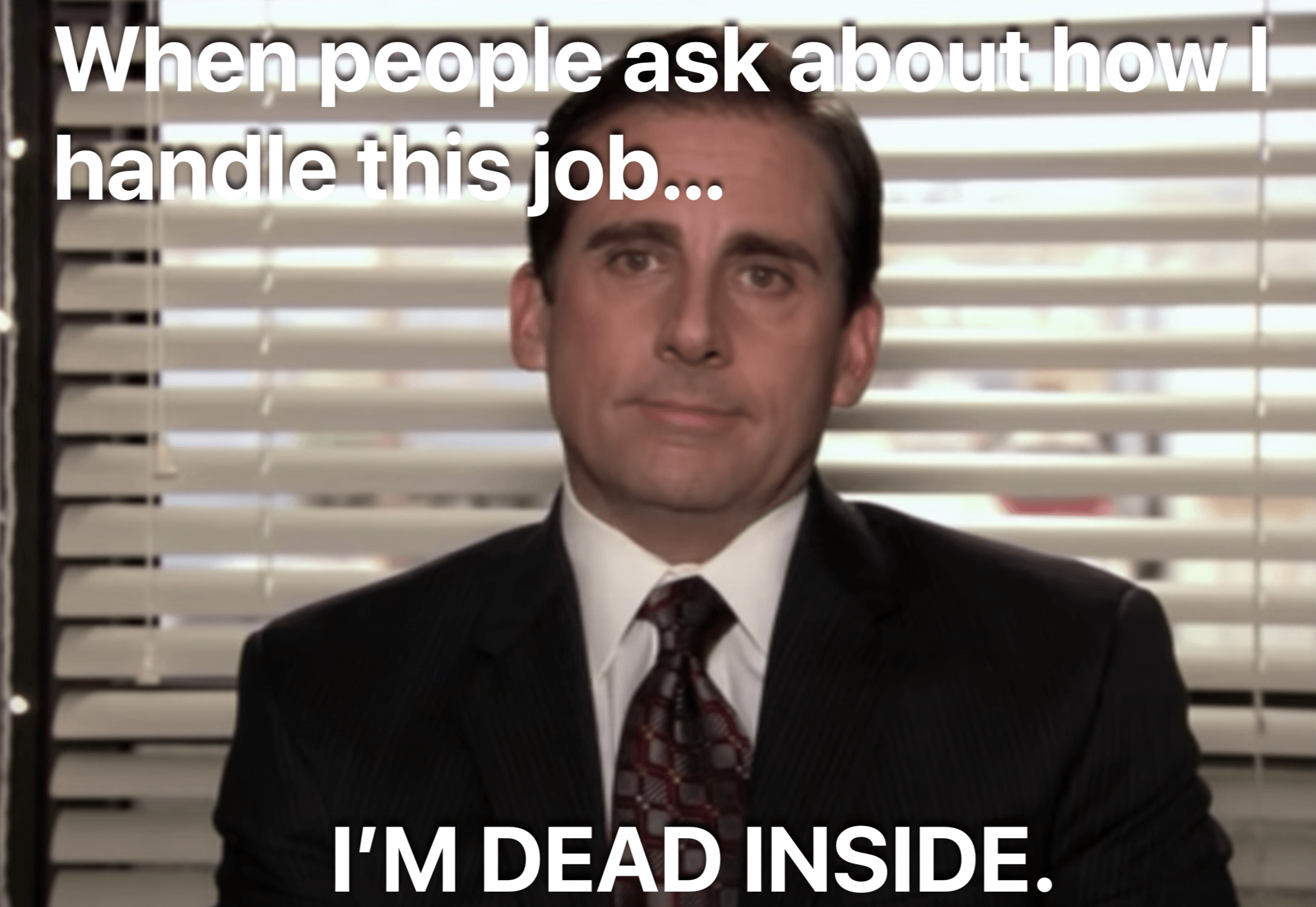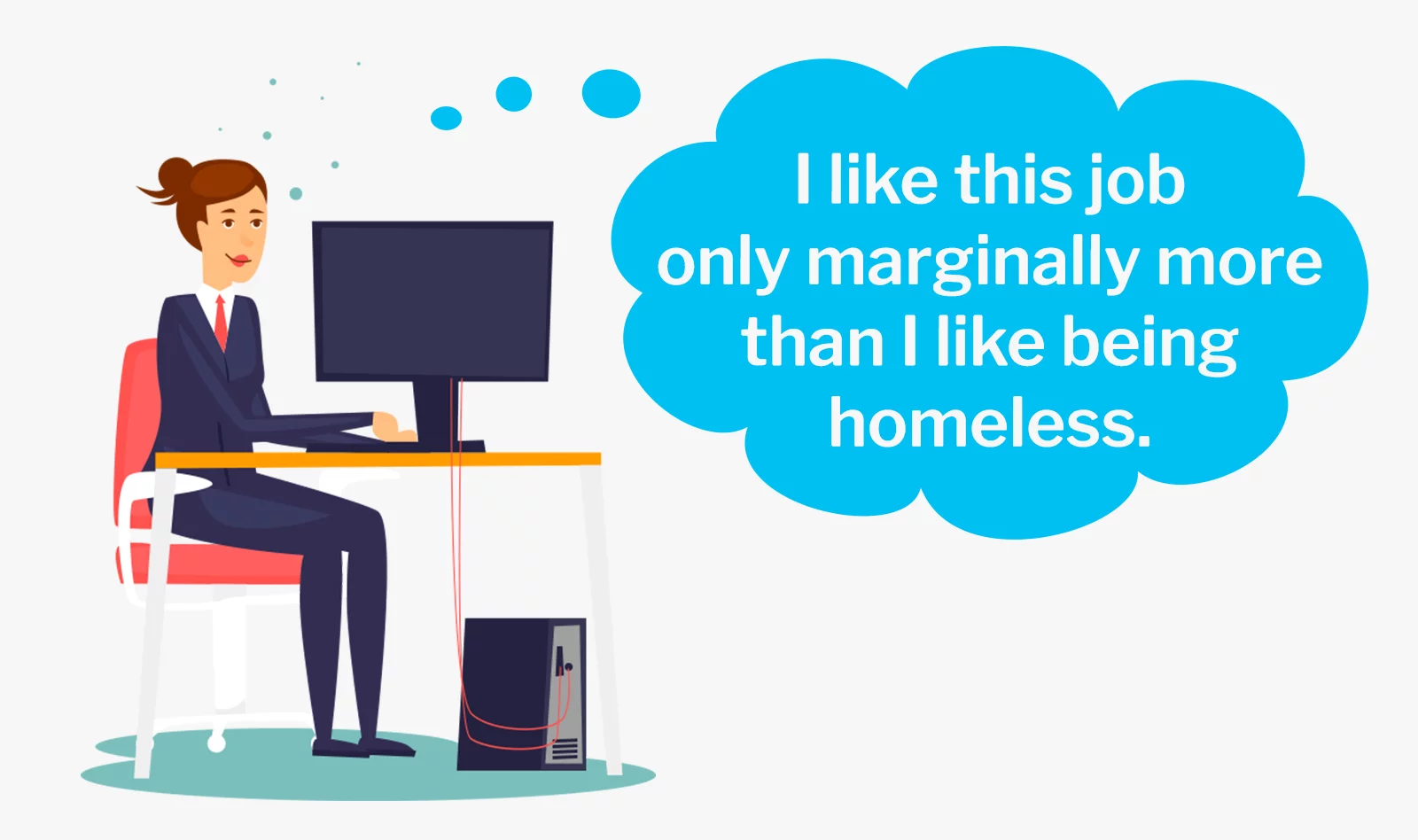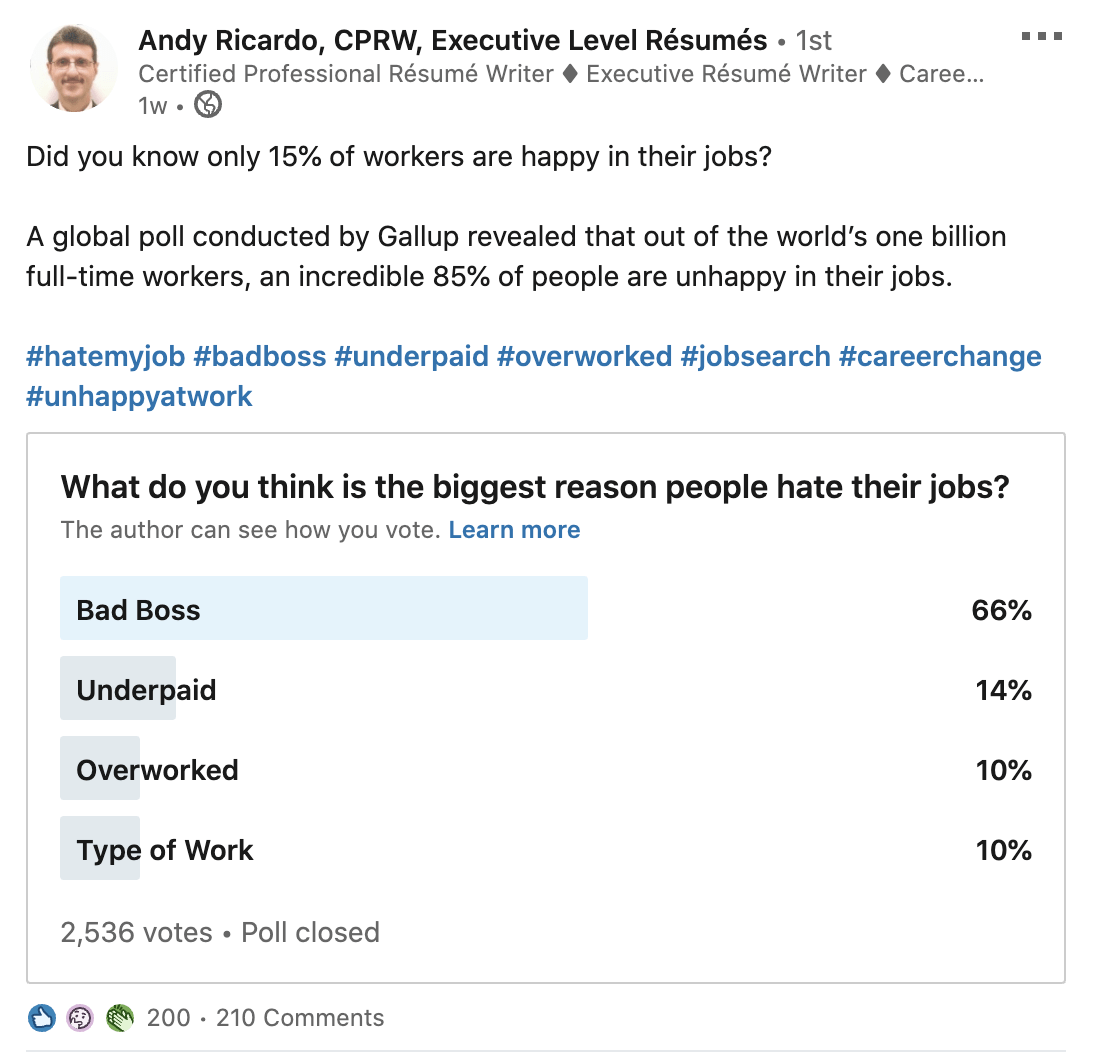A staggering majority of people hate their jobs.
In fact, a global survey across 160 countries found that only 15% of employees feel engaged at work.
This means that around 85% of the global workforce is not satisfied with their job.
Yikes!
This is such a common problem that even Southwest Airlines made a funny commercial about the issue:
We’re here to tell you that there is a solution when you hate your job. There are actionable steps you can take to join the 15% of employees who actually enjoy going to work.
We recently conducted a poll on LinkedIn to discover the main reasons people want to quit their jobs. The poll had more than 2,500 participants from a variety of industries and career levels.
Here is what we discovered about why people hate their jobs:
Are you surprised to see that the main reason people hate their job is because of a bad boss?
Clearly, there is truth in this well-known expression: “People don’t quit jobs. They quit bosses.”
Many people also cited other reasons they hate their job, including being underpaid, feeling overworked, and facing a lack of enjoyment with the type of work they do.
Below, you will find practical advice for what to do when you hate your job, several tips to help you fix the problem at work, and strategies to help you avoid these problems with future jobs.
So if you don’t like your job, but don’t know what else to do, your answers are below.
I Hate My Boss (or Coworkers)

Case Study 1: Sarah and Her Bad Boss
Sarah had high hopes after college. Getting her first job within a few days of graduating felt like a grand step toward having all those dreams come true.
But after six months, Sarah has discovered her job is not everything she hoped it would be.
Her boss is a stage 5 micromanager. To make matters worse, he’s never shown the slightest bit of appreciation, no matter how hard Sarah works.
What should Sarah do?
Quitting is always an option.
But before quitting, there are a few ways Sarah, or anyone else, can attempt to fix the situation.
How to Fix Your Situation With a Bad Boss
If you hate your boss, having a level-headed conversation about your unhappiness might seem impossible.
And of course, the last thing you should do is burst into your boss’s office and list the 100 reasons why you hate him/her.
Instead, take time to reflect on the situation and prepare talking points before speaking with your boss.
Once you are ready, follow these steps to get the conversation going:
Step 1: Ask your boss to schedule a one-on-one meeting with you.

If you have a few minutes to chat one-on-one this week, I’d greatly appreciate it.
Step 2: When you meet with your boss, use “I feel” rather than “you are” statements.

I feel micromanaged/underappreciated at work. Despite giving 110% to my job, I have received little freedom/praise.
Step 3: Propose a solution to the problem.

It would make a world of difference if I was trusted to make decisions on my own. I am confident in my ideas and feel that being micromanaged is stunting my ability to serve the company.
If you are having issues with a coworker, you can use the same steps mentioned above: schedule a one-on-one meeting, use “I” statements when making your points, and suggest a solution to the ongoing issue.
Your boss or coworkers will typically respond in one of two ways.
The ideal response would be that they acknowledge the problem and your feelings. They apologize and take actionable steps to improve the situation. (Hey, it could happen!)
On the other hand, your boss may react dismissively and completely disregard your feelings. A truly bad boss might even turn the situation around on you and fail to take you seriously.
A disagreeable coworker will try to make you feel like the victim and the reason for their negative behavior.
If your coworker is clearly unwilling to work with you, or you decide you really hate your boss, you should probably start looking for a new job.
 Top Tip
Top Tip
If your boss does not respond positively, end the conversation with a polite, “Thank you for your time.” Put on a happy face, and begin your confidential job search.
How to Avoid a Bad Boss in Your Next Job
Unfortunately for Sarah, her boss reacted negatively. He told her to be happy she has a job in the first place and grateful he doesn’t fire her.
If you encounter a situation like this, understand that this is a toxic work environment that nobody should have to deal with.
The good news is, Sarah has options, and so do you! There are ways to avoid this kind of treatment in future jobs.
Here are a few tips to ensure that you won’t hate your next boss:
- Check the LinkedIn profile of your potential boss. Go through the recommendations section to see what people say about them.
- Reach out to would-be colleagues who currently report to your prospective boss. Ask them about their experience at the company and their boss’s management style.
- Pay attention to the manager and the company culture during the interview and hiring process.
- Finally, ask purposeful questions during the interview to uncover any red flags.
Here are some sample questions you can ask during the interview:
- What is your management style?
- How hands-on are you with members of your team?
- How do you show appreciation to your team members?
- What measures do you track for evaluation and how is feedback given?
It’s possible that your prospective manager will fail to give you candid responses. But, these questions will still help you determine what kind of boss you are dealing with.
I Am Overworked

Case Study 2: John and His Unsustainable Workload
John has been working 50-hour weeks for years now.
It all started when he agreed to stay late to complete a major project nearly three years ago.
Ever since then, the company he works for has been throwing an unreasonable number of assignments his way.
John has had less and less time to spend with his family and friends, and enjoy life outside of work. Saying that he lacks work-life balance is an understatement.
What should John do?
Quitting is always an option.
But before quitting, there are a few ways John, or anyone else, can attempt to fix the situation.
How to Fix Your Situation When You’re Overworked
Work-life balance is a key factor in employee satisfaction.
And the lack of a good work-life balance is one of the main reasons people quit their jobs. Before quitting, try speaking with your boss about your concerns.
Follow these steps to get the conversation going:
Step 1: Ask your boss to schedule a one-on-one meeting with you.

If you have a few minutes to chat one-on-one this week, I’d greatly appreciate it.
Step 2: Prepare in advance a detailed itinerary of your day-to-day work schedule.

I’ve outlined my work schedule for the past month to give you an idea of what I’ve been working on and the hours associated with each task.
Step 3: Prepare an itinerary of your ideal workweek prioritizing the most important tasks.

I’ve also provided a revised schedule proposal. It would allow me to focus on the most important tasks, while maintaining a reasonable work-life balance.
Your boss will typically respond in one of two ways.
Ideally, they will acknowledge that you have been overworked. They will apologize, and take actionable steps to delegate your workload.
On the other hand, your boss may be completely dismissive of your schedule. They will make you feel like you work too slow or you are not working hard enough.
If this happens, it might be time to start looking for a new job.
 Top Tip
Top Tip
Change can take time. If your boss acknowledges you are overworked and agrees to make changes to your schedule, be patient.
How to Avoid Overworking in Your Next Job
Unfortunately, the meeting made it clear that John’s boss didn’t care that John had missed every single one of his son’s little league games. This has left John with no option but to quit his job and do what’s best for his family and health.
The good news is, John now understands there are ways to avoid this kind of treatment for future jobs.
Here are a few tips that can help you avoid a poor work-life balance again:
- Research employee reviews on sites like Glassdoor. Keep an eye out for reviews talking about company culture and work environment.
- Ask your connections working at the organization about their experience. If you don’t have any personal connections, you can easily find local employees on LinkedIn.
- Contact former employees to find out why they left the company.
- Finally, ask purposeful questions during the interview to uncover any red flags.
Here are some sample questions you can ask during the interview:
- What will my typical work schedule look like?
- How does this company value work-life-balance?
- What do you expect me to accomplish in the first 3 months?
- Should I plan for frequent changes to my work hours?
It’s possible that the interviewer will respond dishonestly. However, getting their answers to these questions should give you an idea of how your day-to-day schedule might look.
I am Underpaid or Can’t Move Up

Case Study 3: Jessica and Her Meager Paycheck
Jessica has received a raise only once in the last six years.
She stuck with her job because she enjoys the company culture and working with her boss. But no salary increase for that long is frustrating.
She is a mother now and her family expenses have almost doubled.
What should Jessica do?
Quitting is always an option.
But before quitting, there are a few ways Jessica, or anyone else, can attempt to fix the situation.
How to Fix Your Situation When You’re Underpaid
More than 40% of American workers think they are underpaid.
Over time, this can lead to job dissatisfaction. If you are providing for a family, this can cause even more stress.
If you are not earning what you should be for your job, or you can’t move up, you should talk to your boss about your options.
Follow these steps to start the conversation:
Step 1: Ask your boss to schedule a one-on-one meeting with you.

If you have a few minutes to chat one-on-one this week, I’d greatly appreciate it.
Step 2: Outline your job duties. Point out your achievements over the years.

I have been working for six years at the company and have closed more than 35 high-value deals.
Step 3: Research the current market data from Glassdoor, Payscale, or Salary.com, and present your desired pay range.

I’d like to discuss the possibility of a pay raise. According to Glassdoor, professionals in my position are generally paid between $60,000-$75,000. I am currently making $45,000.
Your boss will typically respond in one of two ways.
Ideally, they will acknowledge that you have been underpaid. They will take actionable steps to increase your pay or promote you.
On the other hand, your boss may be completely dismissive of your thoughts. They will make you feel like your pay is already more than you deserve.
If this happens, it might be time to start looking for a new job.
 Top Tip
Top Tip
You can also consider a transfer to a new department with better opportunities within the same organization if you enjoy the work environment.
How to Avoid Being Underpaid at Your Next Job
Unfortunately for Jessica, her boss was not able to provide a pay raise. He told her that the company was cash-strapped and that he simply couldn’t afford to raise her salary.
Sadly, the paycheck Jessica has been taking home is no longer enough to support her family.
The good news is that she can take steps to avoid being underpaid at her next job.
Here are a few tips that can help you get paid what you’re worth:
- Research market trends and decide on a salary range that is ideal for you.
- Apply to jobs that match your skills and experience as well as your expected salary range.
- Read this guide on salary negotiation before you get to the interview phase.
- Finally, ask purposeful questions during the interview to uncover any red flags.
Here are some sample questions you can ask during the interview:
- What would the career path be for this role?
- Are there any opportunities for growth in this role?
- Does the company reward or incentivize high-performing employees?
- Are job openings typically filled by promoting from within?
The interviewer may not be totally honest about all this. But you can get a good idea of the compensation potential you will have at the company.
I Hate the Type of Work I Do

Case Study 4: David and His Deplorable Job
David was looking forward to his dream job after the successful completion of his law degree. Little did he know that criminal defense was an emotionally draining career.
After two years of helping murderers get off scot-free, David decided criminal defense was just not for him.
He has always wanted to use his skills for good, but feels that he is not accomplishing this in any way.
What should David do?
Quitting is always an option.
But before quitting, there are a few ways David, or anyone else, can attempt to fix the situation.
What to Do When You Don’t Enjoy Your Work
You might be working at a great company, but just don’t like your current job duties. Before quitting, find out if there are alternative positions available at the company.
If the specific work is something that you can’t continue, it’s time to talk to your boss about changes to your role.
Follow these steps to address your job duties:
Step 1: Ask your boss to schedule a one-on-one meeting with you.

If you have a few minutes to chat one-on-one this week, I’d greatly appreciate it.
Step 2: Talk to your boss about how you feel about your current role.

The role I am performing here is not what I had hoped. This is not the type of work I enjoy.
Step 3: Find out if there are other internal opportunities that suit you better.

I really enjoy working for this company. I was hoping that we could discuss the possibility of an internal transfer. Do you feel that there are other departments within the company that my skill set could add value to?
Your boss will typically respond in one of two ways.
Ideally, they will acknowledge your dissatisfaction with your current job. They will take actionable steps to change your job responsibilities or transfer you internally.
On the other hand, your boss may be completely dismissive of your feelings. They will tell you to suck it up and be happy you even have a job.
If this happens, it might be time to start looking for a new job.
 Top Tip
Top Tip
Find hobbies or things to do that interest you outside of work. They will help keep you happy, especially if you hate your current job.
How to Avoid Work You Don’t Enjoy
David knew that he had a passion for helping people. Lucky for him, his boss was able to transfer him to a new division where he was able to work in corporate law.
Do you know what type of work you like? If not, do a bit of soul searching.
Here are a few tips that can help you find a job you love:
- Figure out what type of work you’ll enjoy. Try an online personality test like 16 Personalities or the Clifton Strengths career assessment.
- Hire a career coach to help determine the jobs you’re best suited for with career discovery sessions.
- Reach out to people in a similar career and find out if they enjoy their job. Ask for details about their day-to-day responsibilities.
- Finally, ask purposeful questions during the interview to uncover any red flags.
Here are some sample questions you can ask during the interview:
- What does a typical day on the job look like?
- What’s the average tenure of other employees in this role?
- What skills are valued most for performing the job responsibilities?
- What are the most challenging and rewarding parts of this job?
Armed with these tips and with a bit of patience, you are sure to get a job that you don’t hate.
Key Takeaways & Funny Resources
More than 85% of the world’s workforce feels unsatisfied with their jobs. And it’s perfectly normal to want to quit a job you hate.
Figure out what makes you tick and what will help you feel fulfilled in the work world.
Then use the steps above to either fix the problem with the job you hate or avoid it with future jobs.
To sum up our key points, if you hate your job, here’s what you should do:
- Determine why you hate your job (bad boss, low pay, etc).
- Address these issues with your employer (an awkward but necessary step).
- If improvement is not possible, plan an exit strategy (try to stay employed while job hunting).
- Do research during your job search to avoid similar issues with your next employer (Glassdoor, interview questions, etc).
Now for the fun stuff!!!
If you got a laugh at the memes above, you are definitely going to enjoy this.
We’ve compiled a list of memes, forums, and videos all related to people who hate their jobs.
Quiz to determine if you hate your job
Extremely bizarre music video titled, “I Hate My Job”
Reddit forum with others who hate their jobs
Another interesting Reddit forum about bad bosses
Memes on Google Images about hating your job
While you may be unhappy in your job, remember to try to have fun and enjoy the little things in life.
If you decide that you need to quit job that you hate and find a new one, we can help.
Our professional resume writing and Reverse Recruiting services might be just what you need to land a job that you love!





